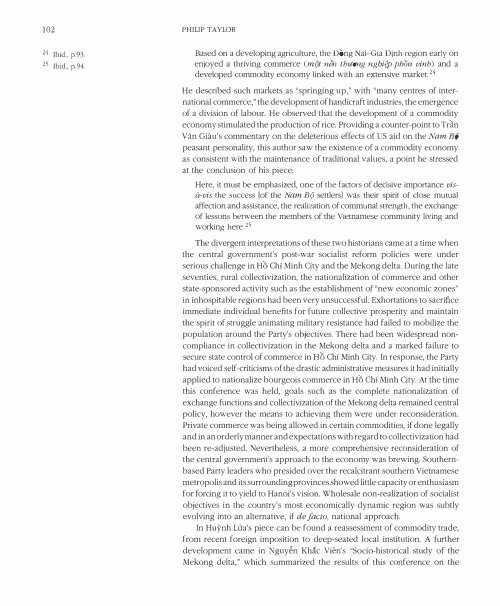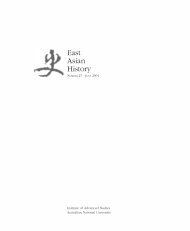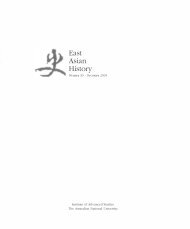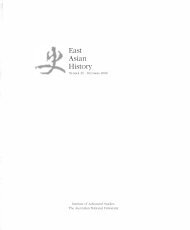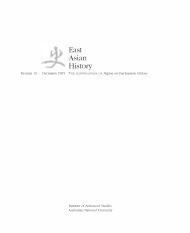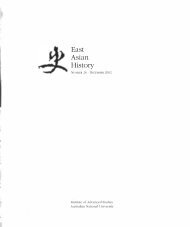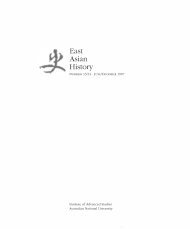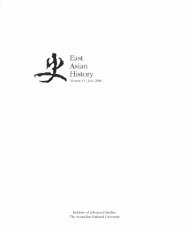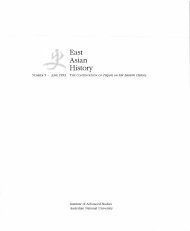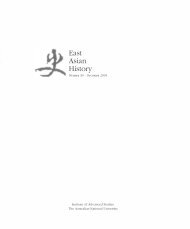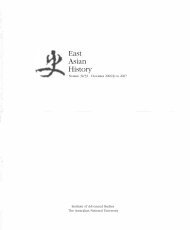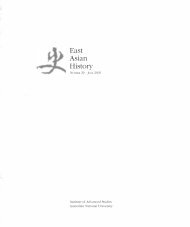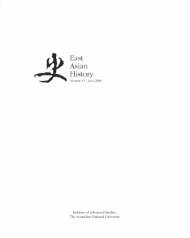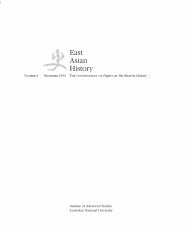(Philip Taylor) (PDF 3.1MB) - ANU
(Philip Taylor) (PDF 3.1MB) - ANU
(Philip Taylor) (PDF 3.1MB) - ANU
Create successful ePaper yourself
Turn your PDF publications into a flip-book with our unique Google optimized e-Paper software.
102<br />
PHILIP TAYLOR<br />
24 Ibid., p.93.<br />
25 Ibid., p.94.<br />
Based on a developing agriculture, the D6ng Nai-Gia Dinh region early on<br />
enjoyed a thriving commerce (mQt niln thuang nghi{jp phon vinh) and a<br />
developed commodity economy linked with an extensive market. 24<br />
He described such markets as "springing up," with "many centres of international<br />
commerce," the development of handicraft industries, the emergence<br />
of a division of labour. He observed that the development of a commodity<br />
economy stimulated the production of rice. Providing a counter-point to Tr'an<br />
Van Giau's commentary on the deleterious effects of US aid on the Nam B(J<br />
peasant personality, this author saw the existence of a commodity economy<br />
as consistent with the maintenance of traditional values, a point he stressed<br />
at the conclusion of his piece:<br />
Here, it must be emphasized, one of the factors of decisive importance visa-vis<br />
the success [of the Nam BQ settlers] was their spirit of close mutual<br />
affection and assistance, the realization of communal strength, the exchange<br />
of lessons between the members of the Vietnamese community living and<br />
working here.25<br />
The divergent interpretations of these two historians came at a time when<br />
the central government's post-war socialist reform policies were under<br />
serious challenge in H6 Chi Minh City and the Mekong delta. During the late<br />
seventies, rural collectivization, the nationalization of commerce and other<br />
state-sponsored activity such as the establishment of "new economic zones"<br />
in inhospitable regions had been very unsuccessful. Exhortations to sacrifice<br />
immediate individual benefits for future collective prosperity and maintain<br />
the spirit of struggle animating military resistance had failed to mobilize the<br />
population around the Party's objectives. There had been widespread noncompliance<br />
in collectivization in the Mekong delta and a marked failure to<br />
secure state control of commerce in H6 Chi Minh City. In response, the Party<br />
had voiced self-criticisms of the drastic administrative measures it had initially<br />
applied to nationalize bourgeois commerce in H6 Chi Minh City. At the time<br />
this conference was held, goals such as the complete nationalization of<br />
exchange functions and collectivization of the Mekong delta remained central<br />
policy, however the means to achieving them were under reconsideration.<br />
Private commerce was being allowed in certain commodities, if done legally<br />
and in an orderly manner and expectations with regard to collectivization had<br />
been re-adjusted. Nevertheless, a more comprehensive reconsideration of<br />
the central government's approach to the economy was brewing. Southernbased<br />
Party leaders who presided over the recalcitrant southern Vietnamese<br />
metropolis and its surrounding provinces showed little capacity or enthusiasm<br />
for forcing it to yield to Hanoi's vision. Wholesale non-realization of socialist<br />
objectives in the country's most economically dynamic region was subtly<br />
evolving into an alternative, if de jacto, national approach.<br />
In Huynh LUa's piece can be found a reassessment of commodity trade,<br />
from recent foreign imposition to deep-seated local institution. A further<br />
development came in Nguyen KMc Vien's "Socio-historical study of the<br />
Mekong delta," which summarized the results of this conference on the


